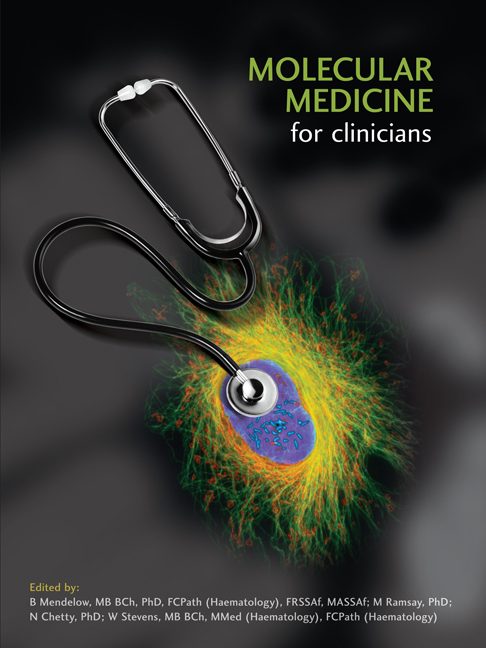Book contents
- Frontmatter
- Contents
- Foreword
- Acknowledgements
- Chapter 1 Introduction
- Keynote Essay 1: Defining Who We Are: DNA in Forensics, Genealogy and Human Origins
- Section 1 Principles Of Cellular And Molecular Biology
- SECTION 2 MOLECULAR PATHOLOGY
- SECTION 3 MOLECULAR THERAPEUTICS
- Chapter 32 Targets for Molecular Therapy: The Biology of Haemostasis
- Chapter 33 Cellular Targets of Antiplatelet Agents
- Chapter 34 Rational Drug Design
- Chapter 35 Chronic Myeloid Leukaemia
- Chapter 36 Gene Therapy
- Chapter 37 Diabetes Mellitus
- Chapter 38 Pharmacogenetics
- Chapter 39 Basic Molecular Biology of Blood Groups
- Keynote Essay 6: Molecular Research Case Study: Developing Novel RNA Interference-based Therapy
- SECTION 4 RESEARCH AND THE CONTINUING EVOLUTION OF MOLECULAR MEDICINE
- Glossary
- Contributors’ Biographies
- Source Material And Recommended Reading
- Permissions And Credits
- Index
Chapter 38 - Pharmacogenetics
from SECTION 3 - MOLECULAR THERAPEUTICS
Published online by Cambridge University Press: 04 June 2019
- Frontmatter
- Contents
- Foreword
- Acknowledgements
- Chapter 1 Introduction
- Keynote Essay 1: Defining Who We Are: DNA in Forensics, Genealogy and Human Origins
- Section 1 Principles Of Cellular And Molecular Biology
- SECTION 2 MOLECULAR PATHOLOGY
- SECTION 3 MOLECULAR THERAPEUTICS
- Chapter 32 Targets for Molecular Therapy: The Biology of Haemostasis
- Chapter 33 Cellular Targets of Antiplatelet Agents
- Chapter 34 Rational Drug Design
- Chapter 35 Chronic Myeloid Leukaemia
- Chapter 36 Gene Therapy
- Chapter 37 Diabetes Mellitus
- Chapter 38 Pharmacogenetics
- Chapter 39 Basic Molecular Biology of Blood Groups
- Keynote Essay 6: Molecular Research Case Study: Developing Novel RNA Interference-based Therapy
- SECTION 4 RESEARCH AND THE CONTINUING EVOLUTION OF MOLECULAR MEDICINE
- Glossary
- Contributors’ Biographies
- Source Material And Recommended Reading
- Permissions And Credits
- Index
Summary
INTRODUCTION
The aim of pharmacogenetic studies is to utilise the inherited genetic differences in drug metabolism among individuals to predict variations in drug efficacy and toxicity. Pharmacogenomics is used as a broader term to include the analysis of all genes in the genome that may influence drug metabolism. Completion of the Human Genome Project and many recent technical advances have attracted much interest to the field of pharmacogenetics. Two principal factors have motivated work in this field: the presence of a large number of adverse drug reactions (ADRs) and the lack of efficacy of certain drugs at conventional doses. ADRs are associated with increased morbidity and mortality, poor compliance, increased hospital stay and re-admissions, all of which contribute to an increase in the cost of treatment.
One of the main areas of interest in pharmacogenetics is the study of polymorphisms in genes coding for drug-metabolising enzymes, drug transporter proteins and others (genotype) that can lead to differences in enzyme activity (phenotype). Enzyme activity can be classified into four groups: poor (PM), inter mediate (IM), extensive (EM) and ultrarapid (UM) metabolisers. UMs have three or more copies of the active gene. These multiple copies result in abnormally high levels of enzyme activity. EM refers to normal subjects who have one or two functional copies of the gene in question and display predicted levels of enzyme activity. IM refers to subjects with one non-functional allele, resulting in reduced enzyme activity. The distinction between EMs and IMs is not completely clear, as some groups consider subjects with one functional copy as IM instead of EM. PMs are subjects with two non-functional alleles and who have no enzyme activity.
DRUG-METABOLISING ENZYMES
Drug metabolism can be defined as the enzymatic biochemical transformation of lipophilic drugs into polar and readily excretable metabolites. Although its major role is detoxification and elimination of drugs and other xenobiotics, metabolism can also transform prodrugs and procarcinogens into active therapeutic and potent carcinogenic com pounds. There are more than 30 families of drug-metabolising enzymes and they can be divided into two groups, namely phase I and phase II enzymes.
- Type
- Chapter
- Information
- Molecular Medicine for Clinicians , pp. 433 - 437Publisher: Wits University PressPrint publication year: 2008



